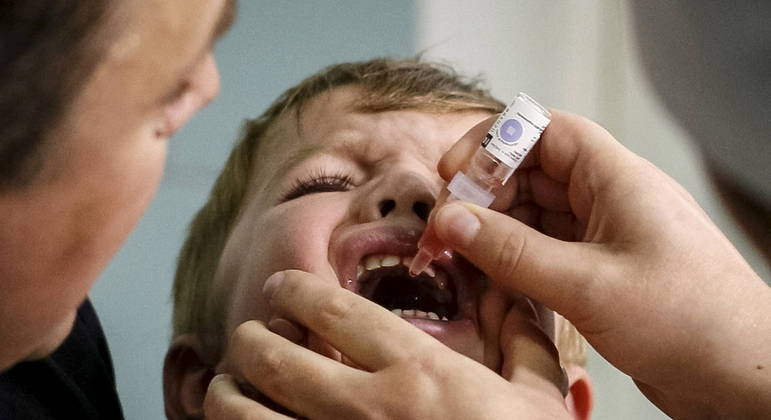Since August 8, the Ministry of Health has issued a Multiple vaccination campaign for children and adolescents The aim is to improve vaccination coverage rates in the country, which have been declining since 2016.
The target audience of the event is 11,572,563 children aged 0, 4 years and 11 months, the immunization agent applied to all of them working against polio.
However, data from DataSUS (Unified Health System Informatics Division) show that adherence is discouraging.
Friday (2), and Roraima State said it was investigating a suspected case of polio. If confirmed, it would be the first in the country in more than 30 years.
With one week left until the end of the campaign, which will be on September 9, only 3,766,643 doses have been applied, representing 32.55% of the individuals able to be vaccinated.
It should be noted that the recommendation for this procedure is that 100% of the mentioned age group receive a dose of the polio vaccine.
“The polio vaccination is a random campaign independent of the vaccination card. Therefore, all children must be vaccinated,” explains epidemiologist Carla Dominguez, who coordinated the National Immunization Program (PNI) through 2019.
By age, vaccination coverage rates are:
– Up to 1 year: 939,331 applied doses out of an expected 2,730,050 – 34.41% coverage
– 2 years: 905,224 applied doses out of 2,954,887 expected doses – 30.63% coverage
– 3 years: 950,375 applied doses out of 2,969,319 expected doses – 32.01% coverage
– 4 years: 971,713 applied out of 2,918,307 expected – 33.30% coverage
Large vaccination campaigns are organized so that health agencies can update vaccination records for children and adolescents. A specific immunization device is used as a bait, but all other prophylaxis applied by the SUS are available to the population.
“When we do a vaccination campaign, we seek to update the vaccination cards for all vaccine-preventable diseases,” the epidemiologist instructs.
For the former coordinator of the PNI, the current vaccination campaign will not be able to achieve the goal of the Ministry of Health.
“I don’t think we will have a successful campaign. If we can’t even get 80% of children to health centers to look at the vaccination history and the application of the polio vaccine, how will we be able to get other vaccines back?”
Carla Dominguez credits residents’ lack of commitment to planning errors by the federal, state and municipal governments.
“An effective campaign requires training of health officials, and the Ministry is responsible for the distribution and ongoing advertising campaigns. The states take care of planning and vaccination. Municipalities monitor micro-data, identifying the population who need it. These are the appropriate and differentiated strategies to conduct active research according to the reality of each city.”
Until the ninth day, including the weekend and Independence Day, next Wednesday (the seventh), many health centers across the country will be open so that parents or guardians take their children to update their vaccination cards, thus preventing the return of diseases such as measles and paralysis Children, whooping cough and several other diseases.
Have Brazilians stopped believing in vaccines?
Brazil is internationally recognized as a model country when it comes to vaccination coverage.
For the director of SBIm (Brazilian Society of Immunization) and SBP (Brazilian Society of Pediatrics), Renato Kfoury, the population continues to trust immunity and this has been confirmed in the vaccination rates against Covid-19.
“When we talk a lot about a disease or an outbreak, people want to get vaccinated. As happened with Covid now, in the outbreaks of yellow fever and measles three years ago. The problem is that the wave passes, the epidemic passes, and everyone stops doing it. Vaccine is routine,” laments a doctor children.
He sees the success of vaccines as one of the reasons for their low rates.
“The common background for all places in Brazil is low risk awareness. And the success is the vaccines, the diseases are eradicated, and people no longer feel threatened. It’s just that there is a case of meningitis in a family member’s school, which everyone runs to the health centers to get vaccinated. Fortunately, it is the awareness of risks that drives us towards prevention.”
a R7 The Ministry of Health inquired about the planned measures to encourage adherence to vaccination in recent days.
In a note, the volume said the following:
“The Ministry is closely monitoring vaccine coverage and has worked to intensify the strategies needed to reverse the low coverage scenario that has been envisaged since 2016, and during the pandemic this scenario has worsened. Vaccination coverage in the country MS is currently working on the national campaign for polio and multiple immunization campaigns. , with the aim of updating the vaccination handbook for children and adolescents under 15 years of age, who are not vaccinated or who have incomplete vaccination schedules, with a particular focus on polio, which aims to vaccinate about 14.3 million children.
The department also recommends states, municipalities and the Federal District to conduct active research on vaccination and reinforces the importance of maintaining routine vaccination procedures. Dissemination of information about the safety and efficacy of vaccines as a public health measure is also part of the year-round action.
Five reasons why polio and measles are re-emerging where they were eradicated

“Hardcore beer fanatic. Falls down a lot. Professional coffee fan. Music ninja.”






More Stories
The law allows children and adolescents to visit parents in the hospital.
Scientists pave the way for the emergence of a new element in the periodic table | World and Science
Can dengue cause hair loss? Expert explains how the disease affects hair